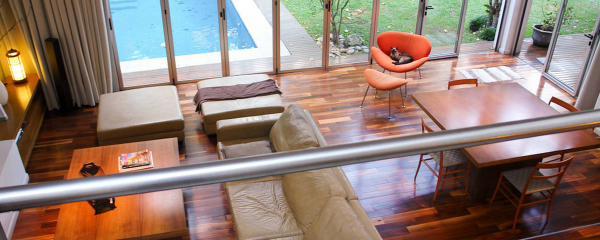8 Tips to Rent an Awesome Apartment Abroad
To me, this is a “worst nightmare scenario”
So you’re starting to realize that many hotels are overpriced and hostels listed as “immaculate” only appear so to backpackers who just spent a week in the Atacama Desert and have decided to explore what this AirBnb and VRBO phenomenon is all about.
After renting about a dozen apartments in about 6 or 7 countries, I’ve learned a few things that will make the search less stressful, leave you satisfied that you got a great deal and ensure you have all of the comforts of home.
This post assumes you know how to use sites like AirBnb or VRBO. There are plenty of posts out there on these services, including one I wrote for Scott at Hack My Trip last year. It also is aimed more at people looking to rent for an extended period of time, from a few weeks to a few months.
1. First and foremost - Photos and Reviews

Wow, THAT looks nice! And 243 positive reviews! Awesome!
You have to know that the owner is serious, that they’ve rented before and that the place is not a dump. Most larger services now employ professional photographers to verify the listing and take great photos, or will at least give the owners tips on how to make the listing as attractive as possible.
If information is missing or the photos look like they were taken in 1997, move on. Similarly if there are no reviews or if the calendar hasn’t been updated for months, you’re better off looking elsewhere. Often owners only used the site once for a trip they took a while back, or something came up and the place is no longer on the market.
2. Know the going rate and use local resources and websites
This is actually a pretty decent deal for a 1 bedroom out of a two bedroom apartment. At $300/mo, this beats the pants off of any hostel and the location IS actually amazing (Uriarte is two blocks away from the “action” of Palermo SoHo)
Since these sites are focused on short-term vacation rentals, the rates are considerably higher than if you’re a local renting for 12+ months. Think of it as a “foreigner’s discount.” It does pay to do your research though. In places like Thailand and Argentina, prices online are usually far higher than what you can negotiate in person or if you use local services like CompartoDepto (in Spanish, but works with Google Translate). Craigslist can be an option, but outside of the US it often contains fake posts, ads from mega-leasing agencies for apartments that aren’t on the market or are misleading ($200/mo, Apartments with private security and rooftop pool — these are two DIFFERENT apartments…) or listings clearly targeted at tourists with fat wallets (Wow! $500 for an apartment in Palermo SoHo! Oh… per week? per night!!!???) Check out the listings in the local paper once you arrive, there may be a huge gap from what you were quoted online.
IF it’s too good to be true…
When I moved to Buenos Aires, articles online told me that rentals to non-nationals were quasi-illegal and that you shouldn’t expect to find anything south of $1,000/mo. Kind of steep. After doing some research, I found that it’s certainly legal, and there are plenty of decently furnished apartments smack dab in the neighborhoods I wanted to live in for $350-700 a month, depending on how much space and privacy you wanted. It pays to do some legwork.
Just asking around on expat forums will give you a good indication of how much a studio or 1 bedroom should cost in a particular neighborhood. Keep in mind that apartments in residential, rather than touristy or beach resort locations, will often command more competitive prices and have better access to public transit. Other good resources are friends and coworkers from those countries that can give you insider advice on where to live and how much it should cost.
3. Book temporary housing for the first two nights
I swear, I only need the Park Hyatt for TWO nights!
While booking site unseen is necessary if you’re only visiting for a few days, if you’re staying anywhere for an extended period of time, it pays to check out more than one place. You’ll get a much better sense of what type of build quality should be expected and how big or small words like “cozy” or “spacious” really mean. I guarantee you it’s different in Tokyo vs. Sri Lanka.
Booking at a hostel or hotel also allows you a chance to meet other travelers and take advantage of local resources, friendly front desk staff and word of mouth. By not lugging your stuff around, you save wear and tear on your luggage and can hit up far more places more places in a reasonable amount of time.
4. Understand you’re looking for short/mid-term housing, not your dream home

LOVE IT! Does it come in white?
LOVE IT! Does it come in white?
I also encourage booking temporary housing for only two nights to put some time constraints on your search. You are looking for a functional place to live, not your dream home. Doesn’t have granite counter tops? How many dinner parties are you really throwing? Doesn’t have an indoor gym? Go for a run or brush up on your pushups in the apartment.
While it’s tempting to hold out for the property that maximizes the hell out of your prospective budget, it gets taxing very fast and you’re likely to fall victim to decision paralysis. You can always commit for only a month and re-evaluate when you know the city better and have made some friends who will point you towards better value. Like many things, cities themselves have learning curves and the longer you live in them, the better housing you’ll get for cheaper prices.
To be perfectly honest, more often than not, having lived in half a dozen luxury apartments myself, people don’t use the amenities nearly as much as they think they will. “Wow a BBQ pit!” Do you know enough people to throw a BBQ in this band new city? “Amazing a swimming pool!” You know that the ocean is three block away right? And there’s a public swimming center down the street? And it’s winter?
5. Check the utilities - Wi-Fi, Hot Water and Climate Control
What do you mean “no hot water”!?
As you check out a few places, there are some things you should really test throughly before you commit.
First and foremost, Wi-Fi. This is your link to the outside world. Remember that a lot of these properties are not full-time residences and the person renting it to you probably doesn’t watch dozens of movies on their laptop there. Nor may the reviews fully capture the state of the connectivity accurately, as they are often written by tourists who are more likely to be out sightseeing than trying to conduct business calls on Skype or stay in touch with loved ones. Ask the host for the Wi-Fi key and conduct a speed test. Typically you’re looking for 1MBps down AND up for reliable VOIP.
Next, hot water - You like hot showers right? I’ve stayed at a few places where the plumbing is old, or the hot water heater is broken, or non-existent. Ask to run the shower to see how long it takes to get warm. A minute or two is perfectly fine, twenty is not (I actually rented a place where it took a full half hour for the shower to heat up. Since that was so horrendously wasteful, I resigned myself to starting each day in a shitty mood because of the cold showers).
If you’re staying in most parts of the world that don’t have perfect weather, take a minute to test the A/C and heater. Takes all of a few seconds, but can save a lot of hassle on cold nights or hot days later on.
Other nice to haves like a working coffee-maker, a bike or local cell phone can often be worth inquiring about. Nearly free coffee every day could save you $50 or $60 over the next few months, as could pedaling around the neighborhood instead of taking buses and cabs. I often like apartments with a little space for entertaining (bar, several seats) and a comfy couch to write articles like this. 
6. Other nearby services
Let me just pop off to the store…
It also pays to consider how close other services are. Yes, most apartments in the world don’t have in-unit laundry, but there are usually plenty of places nearby that offer “wash and fold” for you for very cheap. Is there a subway station or main thoroughfare nearby? Where’s the nearest grocery store? Are there coffeeshops, bars and restaurants nearby? A cheaper place may not make as much sense if you have to cab into town every time.
7. Will the owner be around?
Lastly, will the owner be around? How around? It can be risky if they are leaving town, so be sure you have at least one or two contacts in case anything breaks. It can also be awkward if they live in the adjoining room and feel they can barge in or visit anytime. It’s a huge plus in my book when the owner or property manager lives across the street or in the next neighborhood, so if something goes wrong, or even if the city fire inspector shows up for a routine inspection speaking a language you don’t understand, you have someone to call.
8. Finally, real estate is NOT a fungible market - Negotiate, negotiate, negotiate

Last but not least, it’s important to remember that real estate prices are somewhat arbitrary, each property is unique, and it’s one of the few things worldwide that is pretty negotiable. With negotiation, there are often issues that each side places different values on.
For example, offer to pay up front or in cash with a deposit allays the host’s concern that you’ll flake. Similarly, a late check out on the last day may solve logistics issues for you trying to make a 9pm flight. Maybe they’ll give you $40 off if you write a good review. It’s all about determining what’s important to each party. If cleanliness is important, ask about cleaning services. You may be doing your host a favor by drumming up business for a friend, or maybe the host will throw it in for free to sweeten the deal.
If you use these tactics, you’re far more likely to end up with your dream vacation rental.

No comments yet.